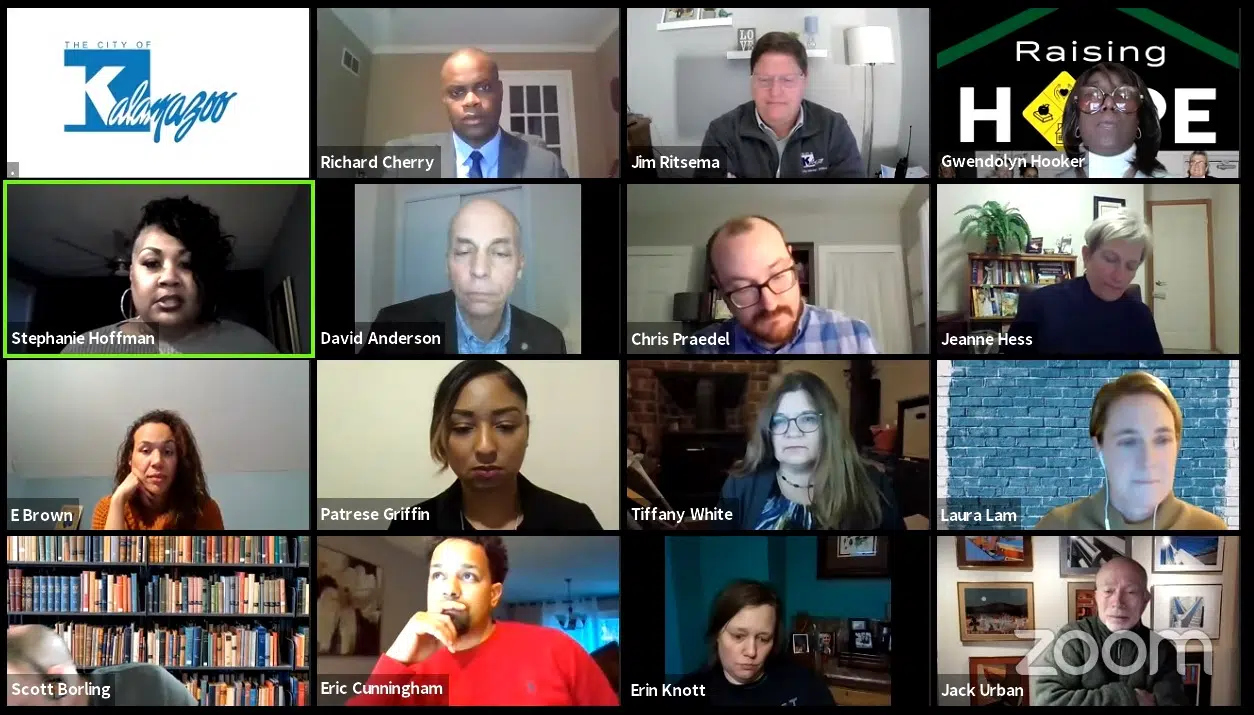KALAMAZOO, MI (WKZO AM/FM) — To help support efforts in homeless assistance. Kalamazoo City Commissioners have voted to approve an agreement in the form of a $250,000 grant to the United Way of the Battle Creek and Kalamazoo Region.
During a virtual meeting Monday, Commissioners discussed the matter at length with representatives of various housing assistance entities.
According to city documents, the funds would be taken from the Foundation for Excellence 2020 Fiscal Year fund balance to support the Disaster Relief Fund (DRF) and amend the 2021 budget accordingly.
Documents further state that the following three priorities are identified for the Disaster Relief Fund:
- to assist with immediate and anticipated direct service needs/gaps
- to maintain or expand critical internal operations, capacity and infrastructure; and
- to support costs associated with additional volunteer capacity needed in this time of crisis.
Current efforts to curb homelessness include providing temporary shelter in the form of hotel interventions through a joint project.
“A primary focus of this DRF grant is responding to crises surrounding Kalamazoo’s large encampments. A partnership including Open Doors Kalamazoo, Urban Alliance, Helping Other People Exceed (HOPE) Thru Navigation, Housing Resources, Inc., Integrated Services of Kalamazoo, Kalamazoo Community Foundation, United Way, Kalamazoo County Continuum of Care, Loaves and Fishes, and others will offer 90 safe and secure hotel rooms for up to 92 days for residents of both major encampments in Kalamazoo between March 8 and May 31, 2021,” city documents say in part. “The proposed City grant of $250,000 contributes toward total projected program costs of $665,330, including room rates, three meals per day, regular laundry service, essential transportation, COVID-19 precautionary measures, and 24/7 staff and security.”
Executive Director for Open Doors Stephanie Hoffman was one representative who spoke during the meeting.
“We could not do this without the entire community’s support,” Hoffman said. “The housing crisis that we are suffering here in Kalamazoo County didn’t just start with the pandemic, we were already experiencing homelessness and housing insecurities for working families and people with no income years ago. What I am encouraged about with this initiative is the amount of support we have, no only from our housing and non-profit sector, but from city and county government and philanthropy. There has never been a time since I’ve been in Kalamazoo over 20 years that I’ve seen this kind of synergy working and happening.”
She said that some of the issues surrounding homelessness include staying in contaminated areas, as well as floodplain areas.
Gwendolyn Hooker of the Raising HOPE organization also provided details on the hotel project. She said that by providing people with shelter, they could work on other issues in their lives, and this joint effort will help deliver on that.
“The opportunity presented itself for us to work with Open Doors and Urban Alliance, and we were happy to jump in and do whatever we needed to do in order to make this project happen as soon as we possibly could,” Hooker said. “This is one of the fastest projects that I’ve actually seen from start to finish in record time, and we are very grateful. We did a lot of things without having the money to do it, and that lands us in front of you today.”
She said that there have already been people housed in some of these hotel rooms.
“We are one week into this project, we just started,” Hooker said. “Last Monday is the first day we started checking people in. We have already met folks and established relationships with people in figuring out what barriers we can break down to get folks where they are trying to go.”
The goal, she said, was to keep people as long as they possibly could to help them, at least until the end of May. At this time, there are 90 rooms total, some of which are doubles, with no current vacancies. At last count, she said there were 107 people that had been housed, including three families.
She added that at least six instances of permanent housing have taken place, and that those individuals had temporarily used the hotel program after coming from a local encampment.
She said that the demographic majority of those housed are Caucasian men from 30 to 55 years old, noting that the organization is aware that it doesn’t encompass the entire homeless population.
For those reasons, Vice Mayor Patrese Griffin said that she was conflicted on voting yes, as she didn’t believe the program to be equitable.
“I’m happy that every last one of these organizations are doing this work, but I am conflicted because the city said they wanted to be anti-racist and inclusive, and this is a $250,000 ask that we know primarily is assisting a certain demographic,” Griffin said. “Where is the ask alongside of it that’s going to be open for everyone?”
She echoed that these issues have been present in Kalamazoo since before the COVID-19 pandemic started, citing homeless mothers and children as another factor to consider.
“Do I want people outside? I do not,” Griffin said. “But do I want to give $250,000 to an inequitable band-aid? No. Not without some assurances that in two weeks, there’s going to be a turn-around that says there’s something for everybody. Because what do we do with these mothers? What do we do with these families that the data already showed were in a problem circumstance?”
Hooker responded to her comments and reiterated the organizations are aware of these issues, calling them “blatantly obvious.”
“We knew going in that most of the time the people that show up in encampments are not women of color, and we have a contingency plan,” Hooker said. “But the first line of defense was to get people off the property that was contaminated and ready to flood. Now, we are intentionally looking at getting women and children or people of color into the rooms. We have set aside rooms specifically for families of color, whatever that looks like. We will address, to the best of our ability, making sure that going forward, we will not only concentrate on encampments, but also focus on families who may not and are not encampments.”
Griffin said that activities like this must not be an after-thought, adding that not all demographics are impacted the same way.
“It’s gotta be a ‘both and,’ and not an ‘either or,’” Griffin said. “I need for that to be on the forefront of everyone’s mind that we’re not in, that I’m not in, because that’s something I’m going to be asking for and expecting from here on out.”
She added that organizations cannot choose when they want to be equitable.
Other officials, such as Deputy City Manager Laura Lam, said that work will continue into making this program better.
“This will be part of a discussion,” Lam said. “If we’re not bringing back what you’re looking for, we’ll continue to refine it. But I do look forward to discussions to make sure we are getting the full vision of the Commission amongst the continuum of how we want to use our resources in the most impactful ways.”
Officials also added that the hotel intervention program will only be one of many interventions, and that activities such as this will continue in the future.
Ultimately, the grant agreement passed unanimously. The program is now expected to continue addressing homelessness in Kalamazoo, with better refinements along the way.
“We are going to work together and have more discussions about regional agreements going forward, like Vice Mayor talked about,” Mayor David Anderson said. “Addressing housing issues is just going to be one of those. It’s an important night, we need to recognize that. This is not the kind of thing that people often run on or have campaigns about, but it represents vast amounts of energy to get to this point.”
Further Viewing:







